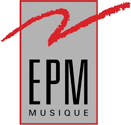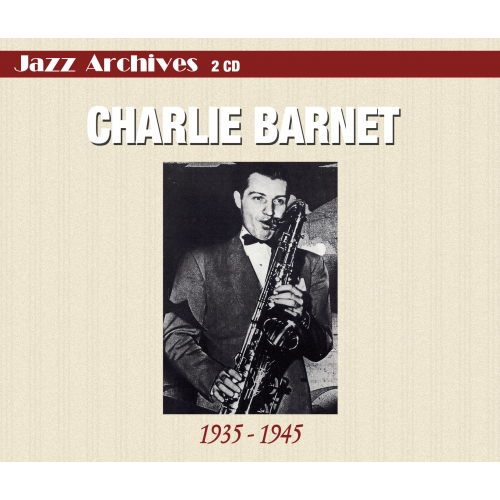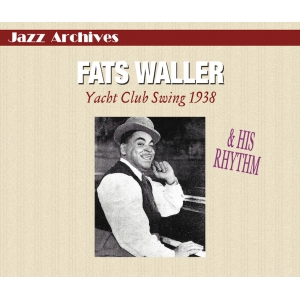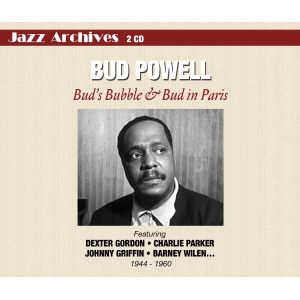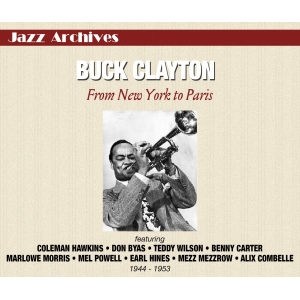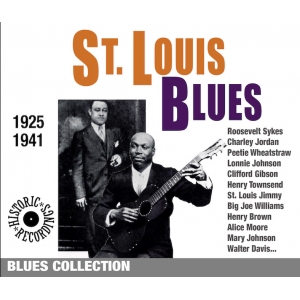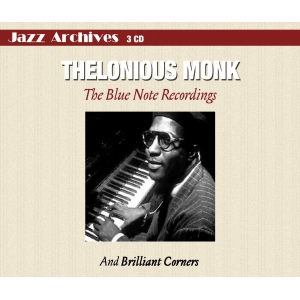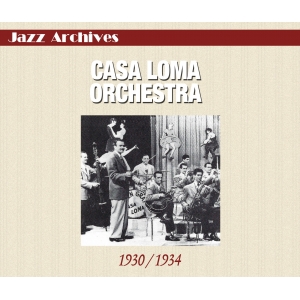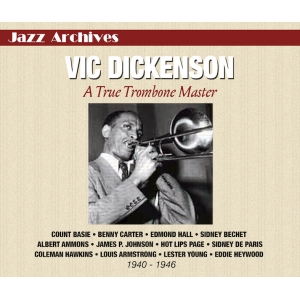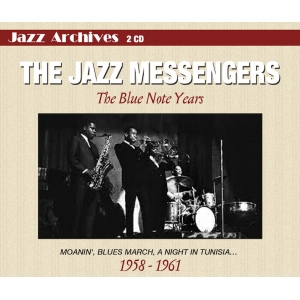Votre panier
Il n'y a plus d'articles dans votre panier
- Promo !
Charlie BARNET
R370
10,00 €
TTC
2CD / CHARLIE BARNET / 1935 - 1945 / A JAZZ ARCHIVES COLLECTION
VOUS RECEVREZ UN BON D'ACHAT 10% À PARTIR DE 40 € DE COMMANDE
POUR REGARDER LES VIDÉOS CLIQUEZ SUR LE BOUTON "VIDÉOS" CI-DESSUS
CHARLIE BARNET / 1935 - 1945
LES TITRES
CD1
Charlie Barnet Orchestra with Eddie Sauter, Chris Griffin, Charlie Shavers Bobby Burnet and others...
1 Growlin'
2 Nagasaki
3 On a holiday
4 Always
5 I'm praying humble
6 Tin roof blues
7 Knocking at the famous door
8 The gal rom Joe's
9 Swing street srtut
10 Some like it hot
11 Scotch and soda
12 Echoes of Harlem
13 Lazy bug
14 Midweek function
15 I never cry
16 Ebony rhapsody
17 Lament for a lost love
18 Cherokee
19 The Duke's idea
20 The Count's idea
21 Ogun badagris
22 Oh what you said
23 The right idea
24 Night clow
CD2
Charlie Barnet Orchestra featuring Robert Burnet, Billy May, Peanuts Holland, Roy Eldridge, Buddy de Franco, Bill Miller, Dodo Marmarosa etc...
1 - Rockin' in rhythm.
2 - Pompton turnpike.
3 -The sergeant a was shy.
4 - Ring dem bells.
5 - Blue juice.
6 - Charleston Alley.
7 - Little John ordinary.
8 - Merry go round.
9 - Birmingham breakdown.
10 - Harlem speaks.
11 - Mother fuzzy.
12 - Smiles.
13 - Oh ! Miss Jaxon.
14 - Strollin'.
15 - Things ain't what they used to be.
16 - The moose.
17 - Pow wow.
18 - The great lie.
19 - Drop me off in Harlem.
20 - Gulf Coast blues.
21 - Skyliner.
22 - E-bob-o-lee-bop.
<object style="margin-left: auto; margin-right: auto;" width="450" height="200" data="
CHARLIE BARNET / 1935 - 1945
LES TITRES
CD1
Charlie Barnet Orchestra with Eddie Sauter, Chris Griffin, Charlie Shavers Bobby Burnet and others...
1 Growlin'
2 Nagasaki
3 On a holiday
4 Always
5 I'm praying humble
6 Tin roof blues
7 Knocking at the famous door
8 The gal rom Joe's
9 Swing street srtut
10 Some like it hot
11 Scotch and soda
12 Echoes of Harlem
13 Lazy bug
14 Midweek function
15 I never cry
16 Ebony rhapsody
17 Lament for a lost love
18 Cherokee
19 The Duke's idea
20 The Count's idea
21 Ogun badagris
22 Oh what you said
23 The right idea
24 Night clow
CD2
Charlie Barnet Orchestra featuring Robert Burnet, Billy May, Peanuts Holland, Roy Eldridge, Buddy de Franco, Bill Miller, Dodo Marmarosa etc...
1 - Rockin' in rhythm.
2 - Pompton turnpike.
3 -The sergeant a was shy.
4 - Ring dem bells.
5 - Blue juice.
6 - Charleston Alley.
7 - Little John ordinary.
8 - Merry go round.
9 - Birmingham breakdown.
10 - Harlem speaks.
11 - Mother fuzzy.
12 - Smiles.
13 - Oh ! Miss Jaxon.
14 - Strollin'.
15 - Things ain't what they used to be.
16 - The moose.
17 - Pow wow.
18 - The great lie.
19 - Drop me off in Harlem.
20 - Gulf Coast blues.
21 - Skyliner.
22 - E-bob-o-lee-bop.
<object style="margin-left: auto; margin-right: auto;" width="450" height="200" data="
Charlie Barnet Dans la plupart des notices biographiques de Charlie Barnet, des auteurs autorisés et même d'autres qui croient l'être, ont qualifié du terme "play-boy" ce brillant chef d'orchestre. Certes, c'était un bel homme et un Don Juan, onze mariages contre huit au palmarès de son collègue Artie Shaw. Dans ces mêmes notes, l'étiquette de "fils à papa" lui est appliquée par ces mêmes "historiens". C'est ridicule. Nanti ou pas, Charlie Barnet va faire la route de ce métier qui le passionne avec ses propres ressources, son énergie, ses dons, sa soif du bien vivre,sa chance… et ses relations. Si dans sa prime jeunesse Charlie Barnet était loin d'être dans le besoin, il convient avant tout de le considérer comme un sacré meneur d'hommes à la tête d'une véritable entreprise comprenant d'excellents musiciens et arrangeurs. Son orchestre fut un des plus appréciés parmi ceux qui existaient à l'époque de l'ère du swing et même après. Né à New York le 26 octobre 1913, après des études de droit et des études musicales, il opte pour le bâton plutôt que pour le barreau. Il pratique sérieusement les saxophones ténor, alto et soprano. Après quelques errances, il organise, à dix-sept ans, un quintette pour jouer à bord de transatlantiques faisant la traversée Etats-Unis-Europe. Entre deux croisières il fréquente les milieux musicaux de Broadway où les grands orchestres l'impressionnent fortement. Parmi ces derniers il apprécie plus spécialement celui de Duke Ellington qui se produit au Cotton Club. Il est plein d'admiration devant la science des sons de Duke. En 1933 il forme un orchestre de douze musiciens afin d'honorer un contrat de six mois au Paramount Hôtel Grill Room, contrat que Charlie a obtenu grâce à la recommandation d'un de ses oncles. La station de radio CBS retransmet plusieurs des passages de l'orchestre et ses dirigeants demandent à Charlie d'enregistrer quelques transcriptions qui seront diffusées en différé, plus une douzaine de faces qui vont être commercialisées. Déjà les arrangements sont signés par Horace Henderson, le frère du célèbre Fletcher, et Benny Carter, une référence! Charlie avait eu l'occasion de rencontrer Henderson et Carter dans les coulisses du Roseland Ballroom et celles de l'Arcadia Ballroom quelques temps avant, lors de ses virées nocturnes dans Harlem. Lors de différentes tournées et engagements, l'orchestre est remarqué par un important dirigeant du département artistique d'une puissante firme de disques avec laquelle Charlie Barnet aura une longue association et produira de 1936 à 1939 une quantité considérable d'enregistrements. Dans cette collection, le premier volume consacré à Charlie Barnet (EPM/Jazz Archives 157492) reprend quelques-unes des gravures allant de 1936 à 1939. Le présent volume offre logiquement la suite de ces enregistrements. Dans le précédent figurent trois compositions de Duke Ellington. Dans celui-ci nous en relevons neuf. Ce choix prouve l'admiration que Charlie éprouvait pour la musique et le talent du grand compositeur et arrangeur que fut Duke Ellington. Empruntant, achetant serait plus juste, ce matériel orchestral, Charlie lui rendait un fervent hommage sans cependant le plagier ni l'imiter. Au demeurant, les thèmes ellingtoniens furent adaptés pour la formation de Charlie Barnet, le plus souvent par l'adroit trompettiste et arrangeur Billy May. Nous trouvons ainsi une fidèle assimilation respectueuse à l'esprit de Duke plutôt qu'un servile pastiche. On ne ridiculise pas son idole et l'orchestre de Duke est une institution depuis 1925. Utiliser son répertoire est lui faire honneur, d'autant plus que les résultats sont excellents comme on peut en juger. The Sergant Was Shy, gravé par Ellington en août 1939 est au répertoire de Charlie dès juin 1940. Les "classiques" Rockin' In Rhythm, Ring Dem Bells, Merry-Go-Round, Birmingham Breakdown, plus anciens de création, sont revisités sous le plume de Billy May alors que Harlem Speaks est confié à celle d'Andy Gibson et Drop Me Off In Harlem à celle de l'élégant Ralph Burns. Dans Things Ain't What The Used To Be, une composition de Mercer Ellington, "cheval de bataille" de l'orchestre qui l'enregistra en juillet 1941, adroitement adaptée par Andy Gibson un an plus tard, le solo de saxophone alto de Charlie Barnet est incontestablement une preuve de l'estime qu'il porte à son idole, Johnny Hodges. Petit mystère : Oh! Miss Jaxson mis au crédit de Duke Ellington n'a semble-t-il jamais eu les honneurs de l'enregistrement par son compositeur. C'est une première! Outre Billy May, devenu célèbre avec ses arrangements écrit pour Glenn Miller, Les Brown et "The Voice" Frank Sinatra, Andy Gibson (1913/1961) fut un arrangeur prolifique au service des formations d'Ellington, Count Basie et Harry James. Horace Henderson a écrit les partitions de Charleston Alle et Little John Ordinary. On voit que pour Charlie Barnet les barrières de couleur n'existent pas. Parmi les musiciens ici présents nous trouvons des "pointures" comme Herbert "Peanuts" Holland (1910-1979), "Little Jazz" Roy Eldridge (1911/1989), Al Killian (1916/1950) et, à d'autres occasions, les noms de Charlie Shavers, Frank Newton, Trummy Young, Oscar Pettiford. Lena Horne fut une des chanteuses de l'orchestre. Enfin Charlie Barnet a donné l'occasion de se faire entendre à des musiciens comme Al Haig et Dodo Marmarosa. Pour ce dernier, The Moose, composé et arrangé par Ralph Burns, est un véritable concerto pour piano et orchestre (de jazz). Howard McGhee (1918/1987), trompettiste bien oublié de nos jours, a lui aussi contribué au répertoire de l'orchestre avec son arrangement plein de fougue pour sa composition Strollin.' Signalons que Pow Wow est une séquelle du Cherokee de 1939 (in vol. 1) et de Red Skin Rhumba de 1940. E-Bob-O-Lee-Bob, initialement gravé par son auteur "Lady Blues" Tina Dixon avec le Flennoy Trio pour l'étiquette Excelsior, est le cousin germain de Hey! Ba-Ba-Be-Bop, enregistré par Lionel Hampton cinq jour avant Charlie Barnet. Ce titre fut aussi un énorme succès pour Helen Humes, la légendaire chanteuse de l'orchestre de Count Basie. A propos de "tubes" et avant de conclure, Pomton Turnpike et Skyliner ont fait un malheur en leur temps de gloire, le premier pour le dialogue saxo soprano/trompette bouchée, le second pour son thème, de construction voisine de celle de Cherokee et pour son brillant arrangement dû à Billy Moore, arrangeur dans l'orchestre de Jimmie Lunceford. Tous les solistes sont signalés dans la discographie. Ils méritent l'attention. Parmi eux, Bus Etri et sa guitare amplifiée, qui aurait dû faire parler de lui. Le destin ne l'a pas voulu, la route l'a tué un soir d'été 1941. Pour conclure ces quelques notes sur Charlie Barnet, le "playboy nanti" qui aima tant la vie et ses plaisirs, mais plus encore son métier dont il a toujours pris le plus grand soin, nous lui devons beaucoup d'avoir permis à nombre de jeunes talents de se révéler dans le jazz des années qui suivront. Jacques Lubin Source : "Those Swinging Year", autobiographie de Charlie Barnet en collaboration avec Stanley Dance - Editions Louisiana State University Press - Baton Rouge et Londres (1984) n most biographical entries, by authors well-informed or otherwise, the name of bandleader Charlie Barnet attracts the label “playboy”. And it is indeed true that Barnet was a good-looking Don Juan, a man who could boast 11 marriages against rival Artie Shaw’s eight! Those same biographies also tend to portray Barnet as having been born with a silver spoon in his mouth, which is a ridiculous way of explaining his immense success. For, no matter what his material origins, an ambitious, life-loving Barnet had to carve out success for himself, mobilising all his own resources, energy and natural gifts — including the gift of knowing the right people. There is no doubt that Barnet did enjoy an easy childhood in a wealthy background, but what really ensured his success was that he was a genuine leader of men, one capable of setting up a big-band organisation that employed top-class musicians and arrangers. Indeed, he was so good at his job that his band became one of the top outfits of the Swing Era and beyond. Born in New York on 26 October 1913, Barnet studied law and music before finally opting for the baton rather than the bar. He specialised on tenor, alto and soprano saxophones. At the age of 18, he formed a quintet to play on transatlantic liners, and between sailings he would frequent the music-spots on and around Broadway, his particular love being the big bands. His main hero at the time was Duke Ellington, whose orchestra was resident at the fashionable Cotton Club. In 1933, Barnet formed a 12-piece band of his own to play a six-month residency at the Paramount Hotel Grill Room, a contract he had hooked through a recommendation from one of his uncles. CBS Radio recorded a number of live performances during this engagement, and also invited Charlie to cut some transcriptions for later broadcast, plus a dozen sides for commercial release. The arrangements concerned were signed by the likes of Horace Henderson (brother of the famous Fletcher) and Benny Carter, hardly meagre references! Charlie had met these two eminent arrangers during his late-night backstage meanderings at the Roseland and Arcadia Ballrooms. This already busy Barnet outfit then came to the attention of one of the top men at a leading record-company of the day, resulting in a long, fruitful collaboration that between 1936 and 1939 produced a significant quantity of discs. The first Charlie Barnet CD in this Jazz Archives collection (No. 30 on EPM 15749-2) offered sides from that 1936-39 period. The present volume picks up the story in 1940 and takes us through to 1945. That earlier volume included three Duke Ellington compositions; here we have no fewer than nine, proof indeed of Charlie’s genuine admiration for Duke. Borrowing (or, more precisely, buying) the Ducal material, Barnet set about adapting it to his own band’s needs, so that the resultant performances were genuine tributes rather than feeble copies or servile pastiches. The key man in such adaptations was Barnet’s trumpeter-arranger, Billy May. After all, Charlie was paying tribute to a band that had been an institution since 1925, whose leader was his idol. You certainly don’t approach such tasks lightly, as the quality of the present performances well illustrates. The Sergeant Was Shy, recorded by Duke in August 1939, entered the Barnet repertoire in June 1940. The classic Rockin’ In Rhythm, Ring Dem Bells, Merry-Go-Round and Birmingham Breakdown are all of earlier vintage, and here receive the highly-effective Billy May treatment, while Harlem Speaks is taken care of by Andy Gibson, and Drop Me Off In Harlem by the elegant Ralph Burns. Things Ain’t What They Used To Be, a Mercer Ellington composition that became a reliable Ducal warhorse from its July 1941 recording onwards, was adroitly adapted by Andy Gibson for Barnet a year later. Its alto-sax solo by the leader provides indisputable proof of his respect and admiration for that great Ellingtonian, Johnny Hodges. Oh! Miss Jaxson is a fascinating exception in that it was apparently never committed to disc by Duke himself. On the arranging front, besides Billy May — who later became famous through his charts for Glenn Miller, Les Brown and Frank “The Voice” Sinatra —, Andy Gibson (1913-1961) was a prolific writer who served the causes of Duke Ellington, Count Basie and Harry James as well as that of Charlie Barnet. And the aforementioned Horace Henderson penned two of the titles presented here, Charleston Alley and Little John Ordinary. A glance at the personnel reveals that Charlie Barnet blithely ignored the colour barrier. Here was a basically white band that also featured such black stars as Herbert “Peanuts” Holland (1910-1979), Roy “Little Jazz” Eldridge (1911-1989) and Al Killian (1916-1950). On other occasions, the Barnet ranks were able to boast the presence of black artists of the calibre of Charlie Shavers, Frank Newton, Trummy Young and Oscar Pettiford, while star vocalist Lena Horne was one of the band’s girl-singers. In addition to which, Barnet also gave vital early chances to budding new talents such as pianists Al Haig and Dodo Marmarosa. Here, The Moose, composed and arranged by Ralph Burns, is a veritable concerto for the Marmarosa piano and jazz orchestra. Howard McGhee (1918-1987), today a somewhat neglected trumpeter, also contributed to the Barnet book, witness his fiery chart of his own composition, Strollin’. Note in passing that Pow Wow is a sequel to the 1939 Cherokee (cf. Volume 1) and the 1940 Red Skin Rhumba. E-Bob-O-Lee-Bob, first recorded for the Excelsior label by its composer Tina “Lady Blues” Dixon and the Flennoy Trio, is a close cousin of the now celebrated Hey! Ba-Ba-Re-Bop cut by Lionel Hampton just five days before this Barnet disc. This piece would also prove an enormous success for Helen Humes, legendary singer of the Count Basie orchestra. While in the domain of “hits”, we must not overlook Pompton Turnpike and Skyliner, both huge successes in their day. The first made its impact thanks to the soprano-sax/muted trumpet passage; the second, to the catchiness of its tune (of similar structure to Cherokee) and its brilliant arrangement by Billy Moore, an arranger with the highly-reputed Jimmie Lunceford orchestra. All soloists are indicated in the discography and fully warrant your attention. Among them is Bus Etri, an electric guitarist who seemed to have a brilliant future ahead of him. Sadly, he was killed in a road accident in the summer of 1941. As a closing tribute to Charlie Barnet, let us remember that this so-called “spoiled playboy” who so loved life and its pleasures was not only a man of thorough professionalism, but one who nurtured the careers of a considerable number of young talents. Artists who would make big names for themselves in the years to come. Adapted from the French by Don Waterhouse
